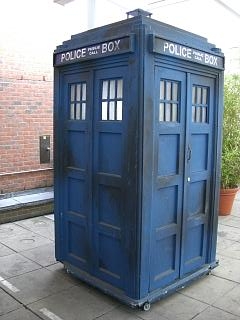
Figure 1 – Tardis time machine from the English television series “Dr. Who.” From the Wikimediacommons, uploaded by Zir, and put in the public domain.
Well, I regret to inform everyone that no one sent me an email response to yesterday’s post before it was posted: no Dr.Who, no Petula Clark or Billy Pilgrim, no Tralfamadorian. Not even the Time Traveler’s Wife bothered to respond ahead of time. It was a bust and rather disappointing.
I am not ready, however, to rule out time travel based on this little experiment. There are three possible reasons why no time traveler responded: 1. there are no time travelers, 2 no time traveler saw my post, and 3. no time traveler reads hatiandskoll.com or cares to communicate with us.
Do not discount the last of these. Time travelers, in literature at least, are a rather apathetic group. If you think about it, a major component of human endeavor is to change things to “build a life for oneself,” or “to make a better life for one’s children,” as examples.Your goal is to change or make the future. When you are “unstuck in time” as for instance Kurt Vonnegut‘s Billy Pilgrim, you kinda lose that motivation. Nothing matters; because you always know what is going to happen – you become truly indifferent.
In our world religions the question of knowing and not knowing the future is akin to the question of preordination. You do not want to become complacent and indifferent. We have, for instance, Matthew 24.2 “Watch therefore: for ye know not what hour your Lord doth come.” And in religions were predeterminism is dominant, little “catch twenty-twos” tend to evolve.
You may have heard the arguments that when a supposed time traveler travels through time, (s)he is really traveling between alternative universes. Such a concept solves a lot of the paradoxes of time travel. For instance, if you go back and kill your grandfather you essentially limit the number of these universes that you can be in. Although like Hilbert’s “Grand Infinite Hotel” there are still an infinite number of universes available to you. Albeit, fewer than the infinite possibilities that there were before. I hope that’s clear! Then, of course, there is the question of what happens when two of these rooms are home to Dr. Spock, one young one old.
That concept seems to work quite well on a quantum level. For bulkier sentient beings, such as ourselves, the argument of parallel universes seems a bit lame. But who knows?
I remain a bit saddened that I received no comments about yesterday’s post until it appeared, which was after all the expected result. I did breathe just a bit harder the moments before the deadline. Such a message would truly have been rather unsettling. And there is something reassuring about not knowing what is going to happen next.
Then there is the quote from Canadian mycologist Arthur Henry Reginald Buller (1874-1944) in Punch (December 19, 1923).
“There was a young lady named Bright,
Whose speed was far faster than light;
She started one day
In a relative way,
And returned on the previous night.”
